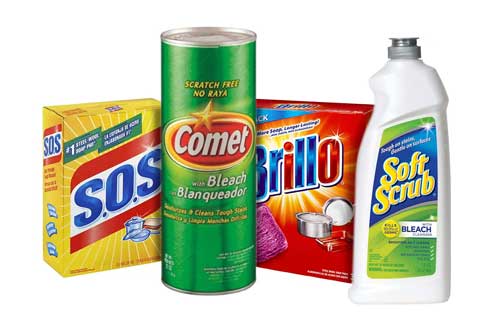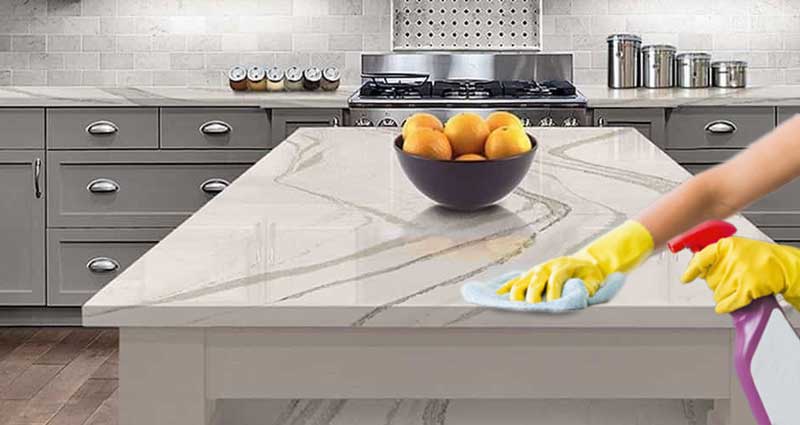How to Clean & Maintain Quartz Countertops
Quartz countertops can be expensive, but there are many reasons why these engineered hard surfaces are so popular. One reason consumers choose quartz is that the surfaces are both easy to maintain and to clean.
For everyday cleaning a mild solution of dish soap and water and a sponge are all that is necessary to remove grease, dirt and dried-on food. Quartz countertops are made by fusing chips of stone, glass and other aggregates with a polymer, creating a durable, glass-like surface. The polymer creates a finish that is nearly impervious to typical household grunge. However, there are care steps that must be taken to insure a long-lasting beauty to the surface.
First, it’s important to remember that quartz countertops are not heat proof. They can actually fracture if an especially hot pan is placed on them. Always use a trivet when placing a hot pan on quartz countertops.
Second, there are certain products that can scratch engineered quartz surfaces including abrasive cleaners like Comet®, Soft Scrub®, S.O.S.® and products that contain pumice. Similarly, scrubbing sponges made of steel wool or abrasive pads can dull a high-shine engineered stone surface.

Third, there are some chemicals that should be avoided as they can penetrate the polymer bound surface, discoloring or dulling the finish of the stone. Cleaners that contain strong alkaline, acid, free radicals and oxidizers whether high, neutral, or low pH. These chemicals are corrosive and/or erosive in their ability to attack any surface.
Finally, do not apply any sealers, penetrants or topical treatments to quartz under any circumstances. Such products will wear off and cause the gloss to appear dull or inconsistent. Indeed, that’s one of the benefits of quartz countertops. No sealing or other maintenance is necessary!
Cleaning Granite Countertops is Largely the Same
Cleaning granite countertops is essentially identical to cleaning engineered stone, with a few caveats. First, granite countertops, unlike quartz, are naturally porous, and that porosity varies based on the type of granite. This means that granite is easier to stain, discolor, or dull with the use of harsh cleaners or certain types of chemicals.
Being porous, granite must be sealed on an annual or regular basis to prevent oils, acidic juices and other harmful items from penetrating the surface. Natural granite is normally sealed when it is installed in your home, but should be sealed yearly by you, the homeowner. Some fabricators can install a 25 year warranty sealer, called Dry Treat. This sealer provides the homeowner with a 25 year warranty against stains. This sealer costs more, but is a one-time applied sealer. The warranty is transferable.
Clean Before Your Disinfect Quartz and Granite Countertops
The CDC recommends that before you disinfect hard surfaces like countertops, that you first clean them to remove dirt, oil, grease and food stuffs. Disinfectant sprays will only work at their maximum efficiency if they are applied to a clean surface. Follow the instructions above to insure that your hard surfaces are clean and ready for disinfection.
- Charge Your Phone or Your Kitchen Dreams? The Freepower.io - June 21, 2025
- Why NKBA Design Certifications Matter A lot, Until They Don’t - September 3, 2024
- 2024 Kitchen & Bath Design Trend: Texture - April 9, 2024

